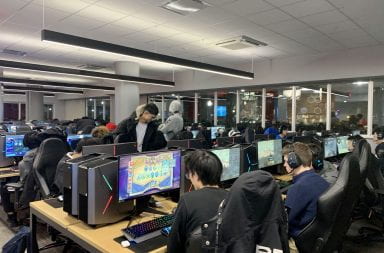The eSports Initiative (ESI) and BuckeyeLAN, the two student-run esports organizations at Ohio State, are planning to increase their size this fall semester with the goal of distinguishing themselves from each other and creating a competitive but healthy gaming community.
With the rise of esports — competitive gaming — ESI and BuckeyeLAN were established quickly, starting with video games like “League of Legends,” “Dota 2” and “Hearthstone.” Both groups welcome all students to join in regardless of skill levels and individual ranking.
“One of our players in the Rocket League team is almost pro-level in terms of his quality of play,” said Christian Hunt, a third-year student in accounting and treasurer of ESI. “So anyone can apply obviously, [but] there’s going to be a limited number of people who actually make it onto the teams.”
Students of a high-enough skill level will have the opportunity to represent Ohio State by competing in tournaments.
“I know we had a fairly good track record at the Big Ten Tournament which was broadcast on the Big Ten Network, so we were fairly high seeded in the most recent tournament if my memory serves me correctly,” Hunt said.
Different from ESI, BuckeyeLAN is not limited to experienced game players; rather it’s open to every esports enthusiast, trying to boost an attractive environment as well as strengthen friendships, according to BuckeyeLAN president Colby Karel.
To draw more attention, BuckeyeLAN will host more competitive events this semester. But it’s still more of a “casual gaming community whereas ESI wants to focus on competitive team management,” Hunt said.
Though both groups relate to video games, BuckeyeLAN emphasizes the “casual gaming” characteristic in an effort to set it apart from ESI.
“It is easy to do competitive events, but it is much harder to create a casual environment and fun events,” Karel said. “Because you have to cooperate with actual people, that’s like building a positive relationship with people and atmosphere conducive to those types of relationships.”
Karel said the university appears to be taking some steps in the management of the esports groups, heading off — for the moment — any need to merge the two organizations, which he said used to have a rivalry that doesn’t exist anymore
Even though the two groups are different, Karel and Hunt both said the appeal of video games is all about team cooperation and strategies instead of the virtual world.



